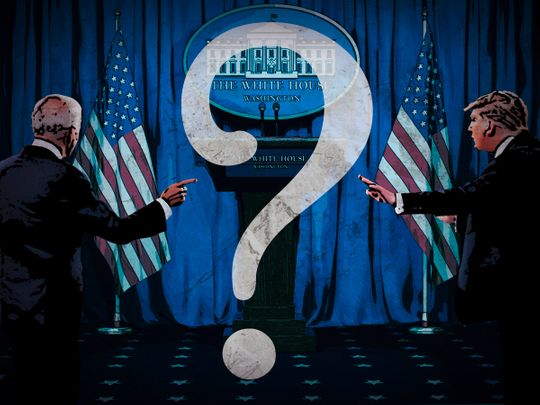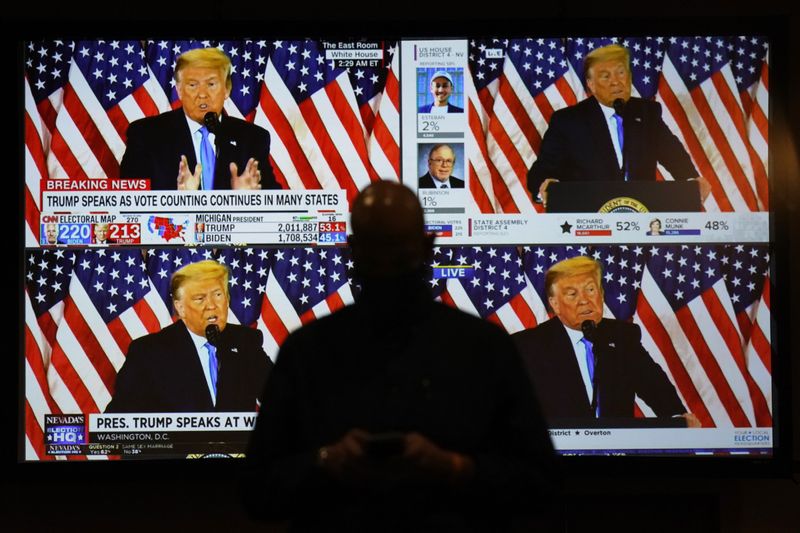
Hold your breath until every vote is counted. And the votes that count are electoral college votes. As dawn breaks today across the United States, there is no clear winner in the race for president — and it may be several days more before the results are known.
First, the history. The turnout is the largest since 1908. It is also the closest race since 1960 and it also brings echoes of the episode of the hanging chads in Florida of 2000 — where the ultimate decision on who would be president was made in the courts and, yes, the Supreme Court. Now the politics. Despite what Donald Trump claimed in a live broadcast to America and, yes, the world — for so much is at stake from sea to shining sea — the election is not his to declare.
There are so many paths to the White House, combinations of states and their precious electoral college votes that decide the outcome. Last time out, Hillary Clinton won the popular vote by a couple of million — Trump won it with 39 votes to spare. And now, that electoral college vote is so finely balanced, the door to the White House can only be opened now by Pennsylvania, Wisconsin and Michigan.

Plan A and B
With 83 per cent of the popular vote counted, Biden is ahead by 1.4 percentage points. If there was a Plan A in the Democratic playbook, it would have seen Biden flip Florida, and at least one of Georgia, Arizona and North Carolina. That hasn’t happened — sure Arizona is now in Biden’s column — but Florida wasn’t even close. The 537 majority for Bush junior over Gore in 2000 was close, Trump won it by a couple of percentage points.
Instead, the Democratic Plan B always focused on a slow blue wave building in the rust-bucket states surrounding the Great Lakes. And for Biden, who grew up in Scranton, Pennsylvania, those creaking, hurting and blue collar states were — and are — his for the taking. If only votes can be counted. Those founding fathers, who came up with the separation of powers, also came up with the notion of the electoral college. But they also left the running of elections at state level. That’s in part why the wheels of democracy now seem so arcane in the US. The Republican candidate wants voting stopped now and wants to take it to the Supreme Court.
Those legal arguments will be for the cold light of another day and week — it will say a lot about modern US democracy if indeed politically-appoint justices are the final arbiters of the political process. And yes, there are legitimate concerns about legitimacy. Before that can happen, all of the votes cast by Americans, those who ticked their boxes either in person or who put their choice in the mail, must be counted. Interfering with the mail is a federal offence — interfering in mailed-in votes isn’t.
Part of a mind game
And right now, we are in a twilight zone, where the contrast between dark and light play tricks on your eyes and on your mind. And yes, Trump saying he won is part of a mind game. When the count continues in Wisconsin, the 100,000 lead for Trump will be hard-pressed to outpace the 700,000 mail-in votes. In Pennsylvania, there are 1.8 million mail-in votes and Trump has a lead of some 600,000. Trump leads in Michigan by 300,000 with another 1.8 million to count. A burst pipe stopped counting of ballots in Georgia — they couldn’t find a late-night plumber to stop the leak — until all of the votes are counted there, who knows what the outcome will be but it looks as if it’s in Trump’s column.
Bush senior was the last one-term president in the US, losing to Bill Clinton in 1992. He didn’t get it. “It’s the economy, stupid” was the famous killer punchline delivered by the Democrat who went on to be impeached in the House of Representatives. Fast forward to 2020, and it is the economy again that saw the last president to be indicted by the lower house hold onto his base. Coronavirus? In exit polls just 18 per cent of voters cited it as the reason for their vote. The economy? Some 34 per cent said it was a driver. And when the dust is settled and the votes are counted and this is all settled, it is the economy that will be most critical in making America great again. And then we will all benefit. That’s economics. Right now, it’s all politics. And counting every vote.
Mick O’Reilly is the Gulf News Foreign Correspondent based in Europe








